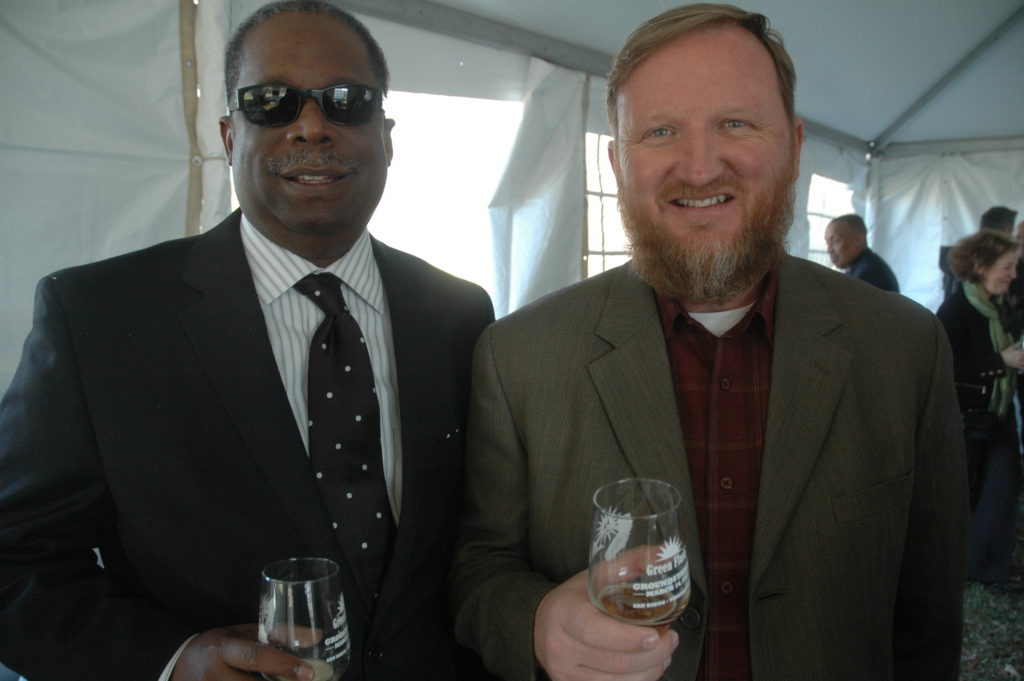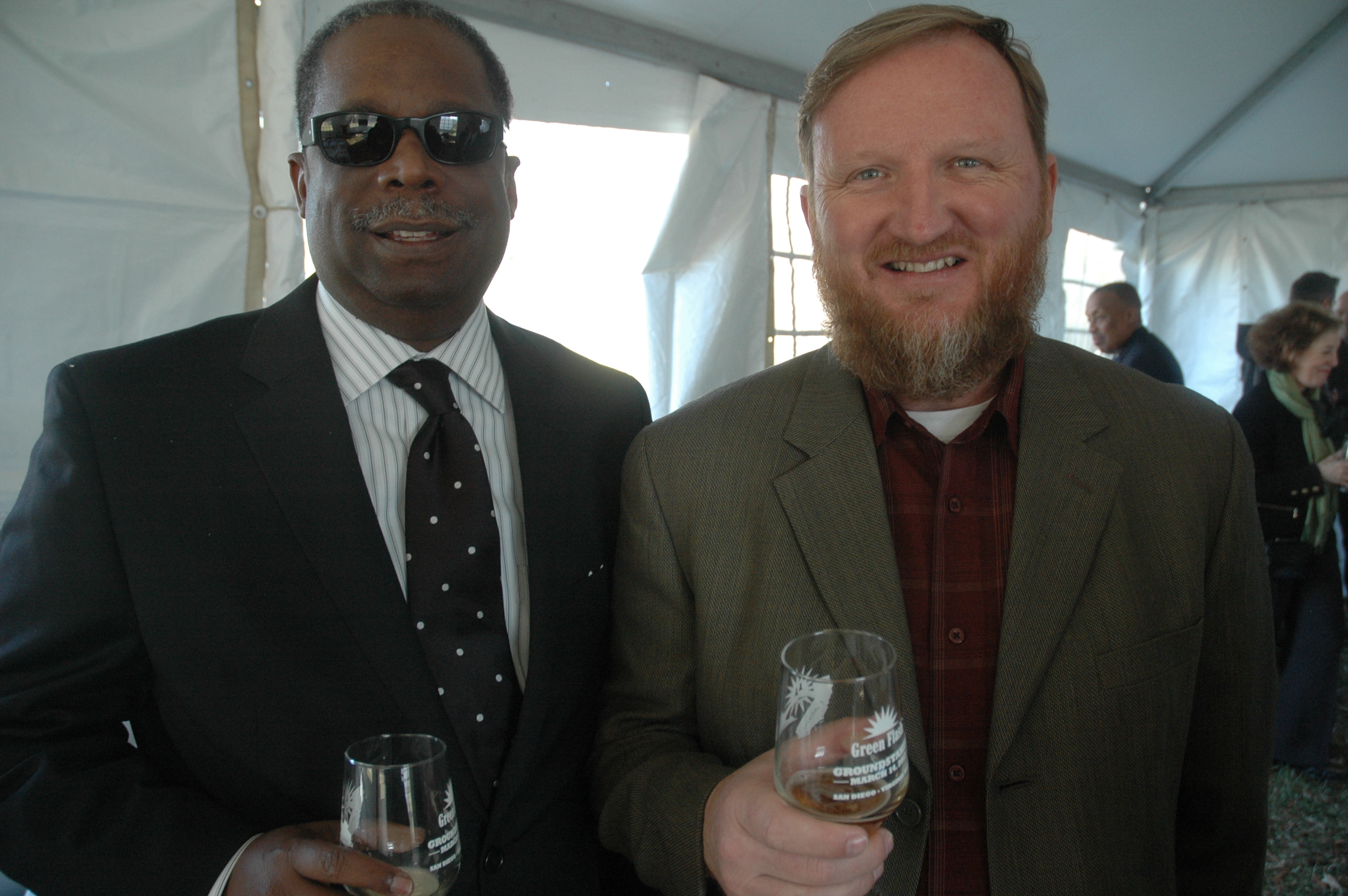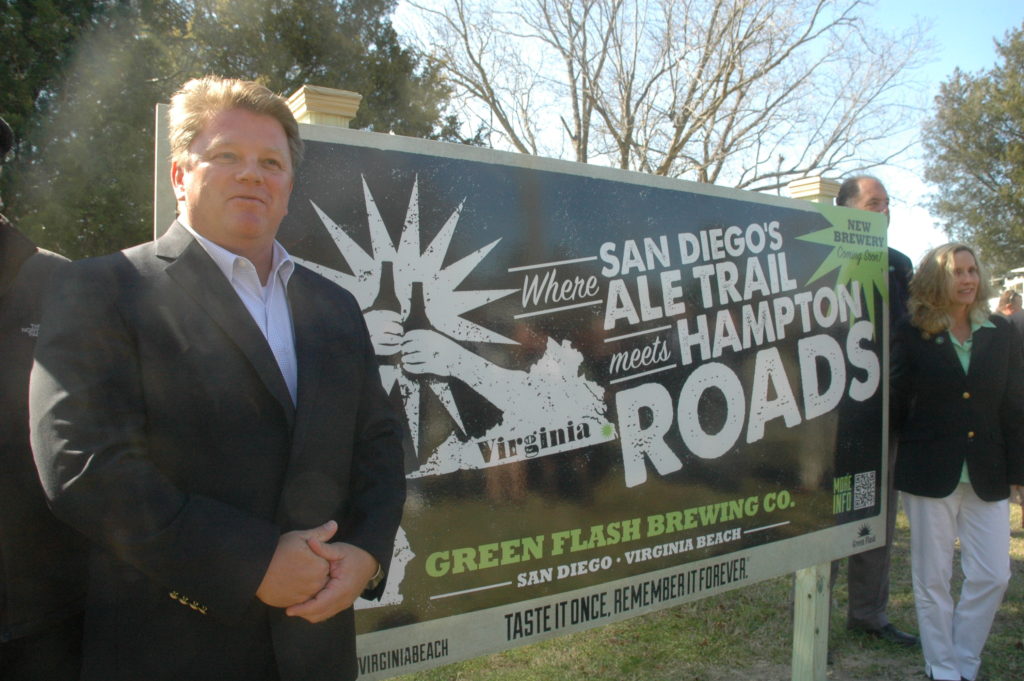
(HAPPY/HOPPY Days in 2013: Virginia Beach Director of Economic Development Warren Harris (left) with then Green Flash head brewer Chuck Silva at the ground breaking ceremony)
BY JEFF MAISEY
When the key owners and investors from Green Flash Brewing Company flew-in from San Diego for the groundbreaking ceremony of its Virginia Beach production facility and tasting room, economic development personnel and politicians from both the city and Commonwealth of Virginia were on-hand with hardhats and shoves for speeches and photo opportunities. That was March 14, 2013.
At the time, landing a major West Coast brewery was seen as a real coup for Virginia Beach’s department of economic development, especially given the attention paid to Stone Brewing’s search for an East Coast location, which the city of Richmond ultimately won.
Delays in infrastructure and construction would see the brewery finally opening and operating in November of 2016.
Much had changed during the construction period, most notably a boom in the number of new craft breweries opening in communities big and small nationwide as well as a developing trend where consumers began to prefer local and regional craft beer and less often chose draft and bottles from many national craft brands.
Green Flash Brewing Company’s sudden abandonment of both its Virginia Beach facility and its entire distribution east of the Mississippi was a strategic decision to “circle-the-wagons” after over-extending its reach in a changing craft beer environment.
Front and center of the Virginia Beach effort was Warren D. Harris, Virginia Beach Director of Economic Development. I was curious what he thought of the latest development and what impact it had on the city. Here’s our conversation:
VEER: Did the city of Virginia Beach receive advance warning of Green Flash’s decision to close its Virginia Beach location?
Warren Harris: The Virginia Beach Department of Economic Development met with Mike Hinkley in January and learned that he was seeking new investor partners. The city received advanced warning from the property owner, The Miller Group in March that rent had not been paid after January. It is our understanding that Green Flash was working to recapitalize up until the point that the bank took over the assets.
VEER: How much money did the city invest in infrastructure (roads, zoning, water/sewage piping etc) for the property?
Warren Harris: Corporate Landing Business Park is a planned corporate environment offering fully-developed and environmentally-clear sites ready for development with all required infrastructure is in place — water, sewer, electricity, natural gas. As it relates to the development of the Green Flash project, the Virginia Beach Development Authority installed turn lanes, cul-de-sac, and regional storm water improvements to serve not only the Green Flash site, but 60 acres of the 325-acre business park. The VBDA was also successful in obtaining a VDOT roadway access grant of $484,000, which was utilized to enhance the infrastructure to service this area of the park. All these improvements will remain in the City of Virginia Beach and benefit businesses that have located or will locate to this area of the park in the future.
VEER: What tax and other financial incentives to the city of Virginia Beach provide Green Flash?
Warren Harris: The Virginia Beach Development Authority approved an Economic Development Investment Program grant in the amount of $275,000 to Green Flash Brewing Co. based on its $20 million capital investment. The investment was made and the criteria for the incentive grant was met when they completed the facility. These improvements will remain in the City of Virginia Beach.
VEER: How much time and money did Virginia Beach invest in the effort to bring Green Flash to Virginia Beach?
Warren Harris: The mission of the Virginia Beach Department of Economic Development is to attract and retain national and international businesses to stimulate capital investment and create jobs. This is an ongoing mission and it would be difficult to quantify time and money spent on the Green Flash project specifically. We were successful in recruiting the company and its $20 million investment that the city will continue to see a return on through real estate tax revenues and future sales tax revenues.
VEER: Do you have any additional comments regarding Green Flash’s unfortunate departure from Virginia Beach?
Warren Harris: Green Flash Brewing Co. put Virginia Beach and the Commonwealth of Virginia on the map for craft beer brewing and distribution after its announcement in 2013 to open an East Coast brewery. Stone Brewing and Deschutes Brewery followed their lead by locating new facilities in Richmond and Roanoke.
It’s unfortunate that Green Flash was unable to sustain its operations in Virginia Beach and the East Coast. However, this presents a tremendous opportunity for a new brewery operator to step in and take over a turn-key business. The location, within miles of the oceanfront, and the state-of-the-art brewing facility is already generating a lot of interest locally and nationally. The facility includes a 58,000-square-foot brewery with the capacity to produce up to 100,000 barrels of beer per year, tasting room, a beer garden, food truck access, retail area and private-event room.
VEER: I understand several breweries have inquired about the Green Flash property. Can you share any names? Are any of the interested breweries from Hampton Roads?
Warren Harris: No, I cannot at this time. I would say that the interest has been both from local and out of area interested parties.





